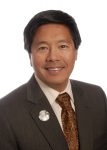The Advanced Education in General Dentistry (AEGD) program is approved by the Commission on Dental Accreditation.
As part of an integrated healthcare system, residents get the unique experience of practicing as a member of a team of healthcare professions dedicated to improving and maintaining the health and wellbeing of the populations we treat. Dentists utilize the same electronic health record (EPIC) as all of the other medical specialties in the HealthPartners system. This allows our providers to be true partners with our medical colleagues in addressing the needs of our patients.
Additionally, HealthPartners Dental Group (HPDG) has a long history of providing evidence based, guideline driven care. Our residents can monitor their ability to deliver optimal care by accessing up to date personal data about their practice patterns. Our goal is to provide the training for dentists to practice not only in the healthcare environment that currently exists, but more importantly, in the environment that will exist in decades to come.
Program leadership
 Todd Thierer, DDS, MPH
Todd Thierer, DDS, MPH
Residency Program Director
 Kevin Nakagaki
Kevin Nakagaki
Assistant Program Director
 Sarah Tague
Sarah Tague
Dental Supervisor and Residency Program Coordinator
